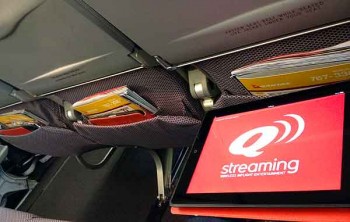
Every passenger gets an iPad on Qantas.
Yep. Even in economy.
Mine never worked, but the airline gets an A for effort.
With their red covers and red splashscreens, you can see the iPads in each seat pocket.
I wonder how many walk away?
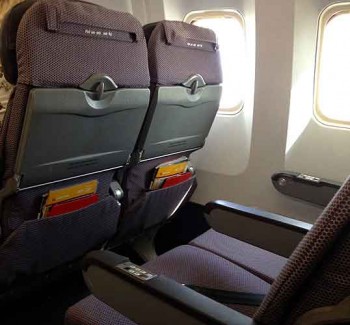

Every passenger gets an iPad on Qantas.
Yep. Even in economy.
Mine never worked, but the airline gets an A for effort.
With their red covers and red splashscreens, you can see the iPads in each seat pocket.
I wonder how many walk away?

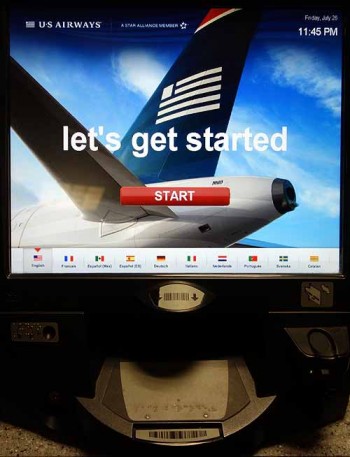
I’m ready for lousy treatment from airlines. I expect it. Even from U.S. Airways, a member of the Star Alliance, of which I’m a top-tier member (“gold”).
U.S. Airways doesn’t extend any special privilege to me when it comes to economy seating, since my Star Alliance allegiance is to United Airlines, where I am a 1K member.
So I expect rotten seats. I get the best I can early, then hope some improvement can be made at check-in. So much for being Star Alliance Gold, the valued frequent-flier.
I followed that practice on our most recent domestic flight. Our client booked Bob and me on separate reservations with seats together in the back. Online, I moved our seats forward to 17A and B.
Early to the airport for our red-eye, there was no crowd and a nice agent quickly volunteered to assist. At the passenger check-in terminal, he brought up the seat map on which we saw certain desirable seats marked with dollar signs. I won’t pay for those on principle. The agent pointed out 5A and B on the screen, which showed available, no extra charge. Great. He booked me into 5A, a window seat.
The agent then logged in for Bob’s reservation and clicked to the seat map. 5A showed occupied now—by me. But 5B, a middle seat, was now marked with a dollar sign. It suddenly required an extra charge!
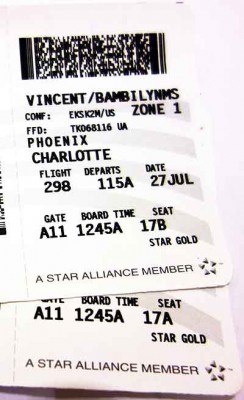
“What happened?” I asked, “it was free just a moment ago. And who charges for middle seats?”
“They charge if you want to sit together,” the agent said. Another agent volunteered that “the system” charges for random seats. But what passenger would pay for a middle seat? Only one who wants to sit next to someone sitting in the adjacent seat, obviously. Not very random, it seems to me. Clearly, an airline seat scam by U.S. Airways.
“Forget it! Just put us back in 17A and B, then.”
The agent fiddled at his own terminal for a few minutes, then informed us that 17A and B were no longer available. He offered something in the 30s.
Bob and I balked, insisting that the agent put us into 5A and B, as he initially suggested, or restore the seats I had reserved online. I waved my printed reservation at him, and he bothered to scrutinize it. We used the words airline seat scam and requested a supervisor.
The agent sweated at his terminal. Magically, 17A and B became available once again. The agent said he “moved someone.” Who knows how these airline seat scams work. Did someone really grab 17A and B during the very few minutes we tried to switch to seats in row 5? Did the agent hit a red “pax balks” button?
So now I’m wondering what triggered the scam, given that Bob and I had separate booking numbers. Could it be that his and my profiles, or frequent flier numbers, show that we usually fly together? Could it be that we booked a window seat, and within two minutes attempted to book the adjacent seat from the same terminal? Could it have been triggered by the agent who volunteered to take over the process? Any of these are possible. Any other instigator I haven’t thought of?
One thing I do not believe is that the seat we wanted was suddenly a “random” charge.
We haven’t experienced everything as very frequent fliers, but we thought we’d at least read everything. This was a first. Charging to sit next to someone? Charging for a middle seat? This is an airline seat scam I hadn’t read of, heard of, or could imagine. Very creative, U.S. Airways!
On February 11, I flew Delta 110 from Buenos Aires to Atlanta. Before the plane pulled away from the gate and after several minutes’ delay, the pilot announced that someone had dropped a Kindle between a seat and the wall, and that it had fallen inside the airplane wall through a panel, and that it would now be necessary for mechanics to come onboard to extract the Kindle because it was unsafe to fly with it inside the wall among various wiring. The pilot predicted that this would cause a delay of at least two to three hours. He sounded disgusted.
While other passengers groaned, I glanced at the wall next to my window seat and saw that a panel beside the seat in front of me was loose and gaping open. A dropped item could easily slip inside the panel and disappear into the wall.
What concerned me was the repercussions of the long delay; not only my own missed connections, but everyone else’s as well. I thought of all the potentially missed jobs (or weddings, or whatever events passengers might be flying to), and the financial and emotional havoc that would be wreaked.
The Delta pilot had specifically implied that the delay was a passenger’s fault. His tone, as well as his words, made this clear. No. The delay would have been Delta’s fault, due to poor maintenance. The wall panels are meant to be securely fastened to the walls, not gaping open.
In the end, it was announced that the Kindle had been “fished out.” Now the captain explained that he had to enter everything into his log book before the plane could take off. The flight was delayed only about 30 minutes.
Interestingly, I received a (random?) survey email from Delta two days after the flight, asking me to comment on my recent flight. I described the Kindle incident and mentioned that I had taken photos of the loose panel in front of my seat. 11 days later, still no comment from Delta.
What if the Kindle had not been “fished out”? What if the flight had been delayed those three hours, causing missed connections, late arrivals, etc.? Would the planeload of people be led to believe that a single clumsy passenger was to blame? Or would Delta step up and admit that its poor maintenance of the plane had allowed a customer’s personal property to cause a safety concern, thereby delaying all 150 (or however many) of us?
Any aviation lawyers out there care to comment on Delta’s liability in a hypothetical situation like this?
Would Delta have been bound to announce that the Kindle entered the airplane wall because a vent panel had not been properly attached? Would the airline then have to make good on everyone’s rebookings, hotels, and other expenses of the delay? If a plane can’t fly with an object inside the wall, is Delta then flying unsafe equipment? There were at least two loose panels on the plane: the Kindle passenger’s, and the one in front of me. How many more? On how many planes? What if a Kindle falls into the wall while a plane is in flight?
Delta? What do you say?
No reports expand on the claim that this ballsy Asian impostor “swapped boarding passes with a U.S. citizen and passenger who was born in 1955.”
What 55-year-old U.S. citizen would agree to swap boarding passes with a stranger? Unless the early-20s Asian wasn’t a stranger… Then why isn’t the 55-year-old accomplice mentioned as a suspect, along with the impostor?
Or was the “swap” accomplished by picking the pocket of the other guy? Couldn’t be easier to slip a boarding pass out of a pocket and replace it with another. But then what? The other guy passes through the gate agent’s boarding-pass-scan while neither he, nor the gate agent, realize the boarding pass isn’t his; he boards the plane, looks at the (swapped) boarding pass to see his seat number, and even now fails to notice someone else’s name on the pass?
MSNBC has posted a PDF of an alleged Intelligence Alert issued by the Canada Border Services Agency. The alert states “It is believed that the subject and the actual United States Citizen passenger … performed a boarding pass swap…” which to me implies that the U.S. passenger was a complicit performer of the swap. But who is this “actual United States Citizen passenger,” anyway? Something’s missing.

All this hearsay, lately, about pickpockets and theft on planes. Even a celebrity-son helped himself to sleeping passengers’ valuables.
Pickpockets are everywhere, and that includes airports, airplanes, and especially luggage carousels. Only you are responsible for the security of your stuff. Here’s what a thief told me, in pickpocket-lingo:
The Stick, the Shade, and the Wire
“JD” an American whiz player, travels to all the top sporting events in the United States. His favorite tool is a garment bag which he calls his shade, a prop to hide his theft of a sting, or a wallet. Dressed in a suit from the wardrobe he’s proud of, he flies to his destination penniless. He described his recent trip to Las Vegas.
“I made $900 coming out of the airport. When the plane lands, I start work. I got to get my money to get out of McCarran airport. Play strictly on skill, that’s how I play—on the plane. Yeah, plane lands, people have their arms up getting their bags. See my man, get up on him, pow, I spank him, off the front leg.
“It was a pappy—a man—right? He got a sting—a wallet—in the front slide, but he also got cash. I played this for his credit card. I got a guy with me we call a writer. He writes the work, writes the spreads. He’s a stick—what you call a stall, what we call a stickman writer. He’s stick and shade. I do the wire. The wire is the one who takes. We split up when we get on the plane, he gets in the back and I get in the front.
“Right now, I can go to McCarran airport and go to baggage claim and beat some stings. Because security is, evidently, lax, and the people are rushing to get their bags, and the bags are coming off the trolley, and I got my garment bag ….
“And when he’s stooping down to get his luggage— …˜Oh, is that mine, sir?’ Shake him up. …˜Oh, is this mine? It looks like mine.’ If you’re moving, and I got someone with me, and you’re in the airport, I’m going to play you. If I feel like I can work you I’m going to play you.
Excerpt from Travel Advisory: How to Avoid Thefts, Cons, and Street Scams
Chapter Three: Getting There—With all your Marbles
Airborne Victim
“Kayla,” a 15-year-old girl, told me how her wallet was stolen on a cross-country flight. Her mother and sister supported Kayla’s story. The thief was a 35ish woman sitting next to her. In the middle of the flight, the woman bent down and pretended to be digging in her purse. But Kayla felt something and looked, and could see that the woman was digging in her (Kayla’s) purse.
Kayla said she was too scared to say anything. The woman got up and went to the bathroom. Kayla checked her purse and found that her wallet was gone. She told her mother. Then she and her mother told a flight attendant. The flight attendant found the wallet in the bathroom, missing only Kayla’s cash. Kayla was still too afraid to say anything to the thief. When the plane landed, the woman just left.
Take Precautions
Is theft on planes a risk worth worrying about? I don’t think so. Then again, if you’re the unlucky victim of a flying filcher, you’ll be plenty pissed. If you sleep, that tiny possibility is there. Even if you don’t sleep, do you know what’s being rummaged above your head? On some planes, a thief could reach behind his feet to access the bag under his seat.
What to do? Just make it more difficult for the casual thief. Bury your valuables within your bags. Use little locks on your carry-ons. Put your bags in the bin zipper down, or with the opening to the back of the bin. (Yeah, I know, wheels in first, they say.) Use the bin across from you, so you have a chance of looking if someone opens it.
Do I do all those things? Can you completely prevent theft on planes? Nope. But you can make your stuff much more difficult to access than the next person’s.
If you’re a heavy sleeper, or like to close your eyes and disappear under earphones, as I do, there’s not much you can do short of sitting on your stuff. Still, I’d be more concerned at a sporting event or concert, than aboard an airplane. JD makes a great living stealing wallets from people in crowds. And he’s still out there.
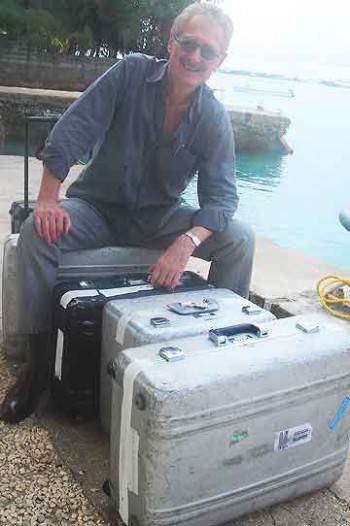
I’m sure it sounds obsessive to mention the necessity of onboard watchfulness when you fly. The likelihood of theft while on an aircraft is low, granted; but it’s unpredictable, and that’s the problem. If you’re carrying valuables, say cash, jewelry, even credit cards, you may as well continue with your precautions. The risks are to the carry-on items you can’t see: those in the overhead compartment can be ransacked practically under your nose—or above your nose. Those under the seat in front of you are vulnerable if you sleep or leave them while you get up. [Read Kayla’s experience, below.] I want to stress that these are low-probability scenarios, especially if you’re not traveling alone. Your degree of precaution must harmonize with your comfort level and the value of the items you carry.
Sadly, suitcases are occasionally compromised while in the airlines’ possession. The odd unscrupulous employee needs only the moment of opportunity. It’s well-known that most luggage locks are next to useless. Keys are generic, and even combination locks have certain pressure points which free latches.
Bob and I believe in hard-sided luggage. The ones we use are aluminum, made by Zero Halliburton. They’re not for everyone, being both heavy and expensive. But when our bags were forced with a crowbar or other tool somewhere on the nether tarmac of the Miami airport, the locks and hinges held tight. Shiny scars in the seam, as if gnawed by a metal-eating mouse, were the only evidence of serious tampering.
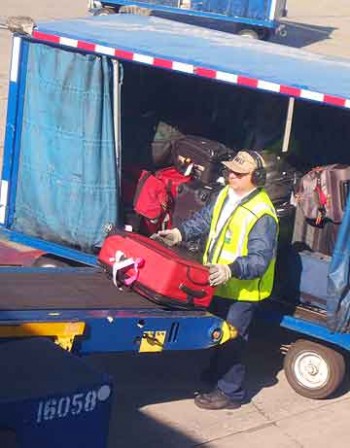
As we watch our silvery Halliburtons trundle off toward baggage handlers in Lusaka, in Santiago, in Mexico City, filled with sound and video equipment or perhaps with our favorite shoes from Florence, we’re eternally grateful for and confident in their sturdy locking mechanisms. Even more so after trying desperately and failing to break into our own locked suitcase when it jammed once in London.
Of course bags like these do call attention to themselves and an argument can be made for using inexpensive luggage. One world-traveling couple we met swore by the cheap stuff. After repeated thefts from their Louis Vuitton cases at Heathrow airport, they resorted to department store brands, buying new bags every year or so. A small price to pay, they say, given the cost of their trip and value of their belongings. That’s their argument, but I don’t buy it. I say buy the best bags you can find and afford and use their locks [whenever possible].
Excerpt from Travel Advisory: How to Avoid Thefts, Cons, and Street Scams
Chapter Three (part-e): Getting There—With all your Marbles
“Kayla,” a 15-year-old girl, told me how her wallet was stolen on a cross-country flight. Her mother and sister supported Kayla’s story. The thief was a 35ish woman sitting next to her. In the middle of the flight, the woman bent down and pretended to be digging in her purse. But Kayla felt something and looked, and could see that the woman was digging in her (Kayla’s) purse. Kayla said she was too scared to say anything. The woman got up and went to the bathroom. Kayla checked her purse and found that her wallet was gone. She told her mother. Then she and her mother told a flight attendant. The flight attendant found the wallet in the bathroom, missing only Kayla’s cash. Kayla was still too afraid to say anything to the thief. When the plane landed, the woman just left.
![]()
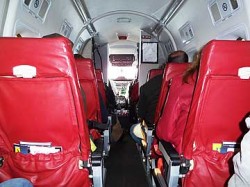
We flew from Anchorage to Homer on Alaska Airlines flight 4878, operated by ERA Aviation. No TSA. No screening; none at all. Liquids? Okay! Weapons? Whatever you want! Just check your large roll-ons and climb aboard, big boots ‘n all.. 20 seats. Open seating, open cockpit.
![]()
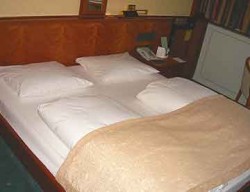
Mid-08, I noted my travel stats year-to-date. Here’s how the year wrapped up.
I made 105 takeoffs and landings during the calendar year. I stayed 162 nights in beds not my own or on planes. A record low for the past few years; probably for the past 15 years, except for 1996 and 1997, when we had a couple of very long-term gigs (and almost grew roots).
This is good, and by design. Although Bob and I still love travel, I’ve felt the urge to indulge my homebodiness more: to enjoy our home, cook, entertain, and get things done that can’t be done on the road. So we’ve made more trips: more domestic, fewer international. That means fewer flight segments per trip and fewer hours in the air. It’s still a lot, though.
2007 had 115 take-offs and landings and 176 nights away from home.
2006 had 117 flights and 184 hotel nights.
199 hotel nights in 2005; 222 in 2004.
I’m not counting any prior years, but I think they were higher still.
![]()
Seeking answers, or shared experiences: On a first class cross-country flight last weekend, the trackpad of Bob’s MacBook Air refused to work. His cursor moved erratically or not at all, or opened contextual menus unasked. He turned off his wifi antenna and made sure bluetooth was off. He restarted. He checked his trackpad prefs. No help.
What worked was raising the laptop 24 or so inches into the air. There, the trackpad worked normally. It also functioned well about a foot below laplevel. Meanwhile, the trackpad on my four-year-old PowerBook was fine in any position, including in Bob’s dead zone.
We were on a Boing 737, row 4, Bob in the aisle seat, if that matters. There was a/c power in the seats, and we were plugged in. We’ve used laptops on airplanes for decades, with and without power, in all cabin classes. This MacBook Air has worked flawlessly on about 30 previous flights.
On the return trip two days later, we had aisle and window seats in row 1 on another B737. Same issue. Bob’s troublesome area ranged from laplevel to tray-table height, with a bad buffer of a foot or so above and below. Again, he was on the aisle.
The Air’s cursor moved normally while on my lap in the window seat, and my machine worked fine in all of Bob’s territory. We did not get up and change seats in order to complete experimentation—perhaps the cause was a combination of Bob’s body on the aisle.
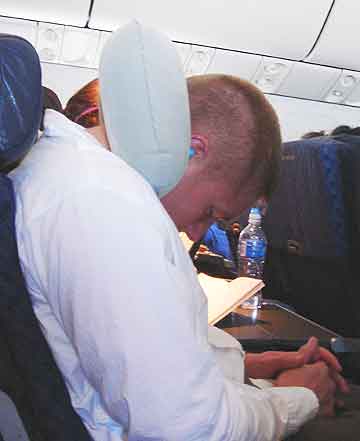
I’ve never understood the logic of this neck contraption. It pushes the head forward—but for sleeping, wouldn’t you rather have your head back? If I had one, I’d wear it backwards. But I don’t want one. I wonder how many people try this thing more than once? Does it work for anyone, or is it just a scam, like the “throw your voice” gimmick I ordered off the back of a cereal box when I was eight? This guy eventually put it in his lap.
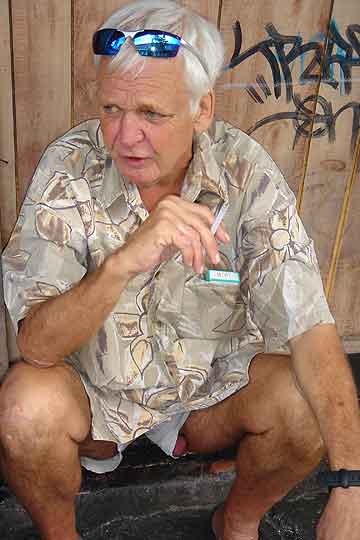
They really hang loose in Honolulu. This man, a former Minnesotan, told us he’s been “tropicalized” after living in Hawaii for 30 years. He works in Honolulu’s oldest bar. I took his picture with his permission.
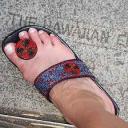

Hong Kong’s famous skyscrapers are just beyond this hill.